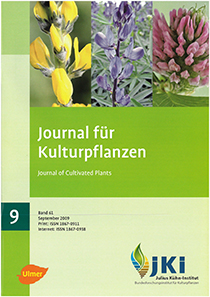State crop experiments (LSV) of grain legumes in the eastern part of Germany – Results of investigations in Mecklenburg-Western Pomerania, Brandenburg, Saxony, Saxony-Anhalt and Thuringia
DOI:
https://doi.org/10.5073/JfK.2009.09.05Keywords:
State crop experiments, grain legumes, faba bean, pea, narrow-leafed lupinAbstract
The cultivation of grain legumes is mainly concentrated in the eastern part of Germany. For loess sites in the middle and eastern parts of Germany as well as for weathering sites in the southeast and diluvial sites in eastern Germany the state crop experiments (Landessortenversuche, LSV) are realised on the basis of the German soil-climate spaces.
In the first instance the results of LSV are utilized for the neutral and regional consulting of farmers and politicians as well as for information of the Federal Office for Plant Varieties. In the LSV of 2003 to 2008, the yields of the grain legumes greatly differed between years and locations, with mean yields showing stagnating or even regressive trends. In the years 2003 and 2006 heat and drought were limiting the production of grain legumes. In faba beans improvements in quality were achieved via the breeding of tannin-free cultivars. The tannin-containing cultivars Fuego and Espresso reached higher yields than the tannin-free cultivar Tattoo. With regard to crude protein content the differences between the cultivars were low. In peas, considerable breeding progress was observed with regard to stableness and straw-stability. Cv. Rocket attained high yields over several years; convincing biennial yield performances were also noticed for cvs. Gregor and Respect. The cvs. Santana, Saskia and Gregor were rich in protein. The advantage of narrow-leafed lupine mainly consisted in its high crude protein content and in high protein yields, too. Especially the cvs. Probor, Idefix and Borlu were rich in crude protein content. In all locations cv. Boregine brought above-average grain yields in several years. At present, critical issues with grain legumes are the low number of registered cultivars (especially newly registered cultivars per year), a lack of yield progress and the difficulties in plant protection (less available fungicide seed treatment products and herbicides as well as high spectrum of pests).
Downloads
Published
Issue
Section
License
The content of the journal is licensed under the Creative Commons Attribution 4.0 License. Any user is free to share and adapt (remix, transform, build upon) the content as long as the original publication is attributed (authors, title, year, journal, issue, pages).
The copyright of the published work remains with the authors. The authors grant the Journal of Cultivated Plants, the Julius Kühn-Institut and the OpenAgrar repository the non-exclusive right to distribute and exploit the work.







